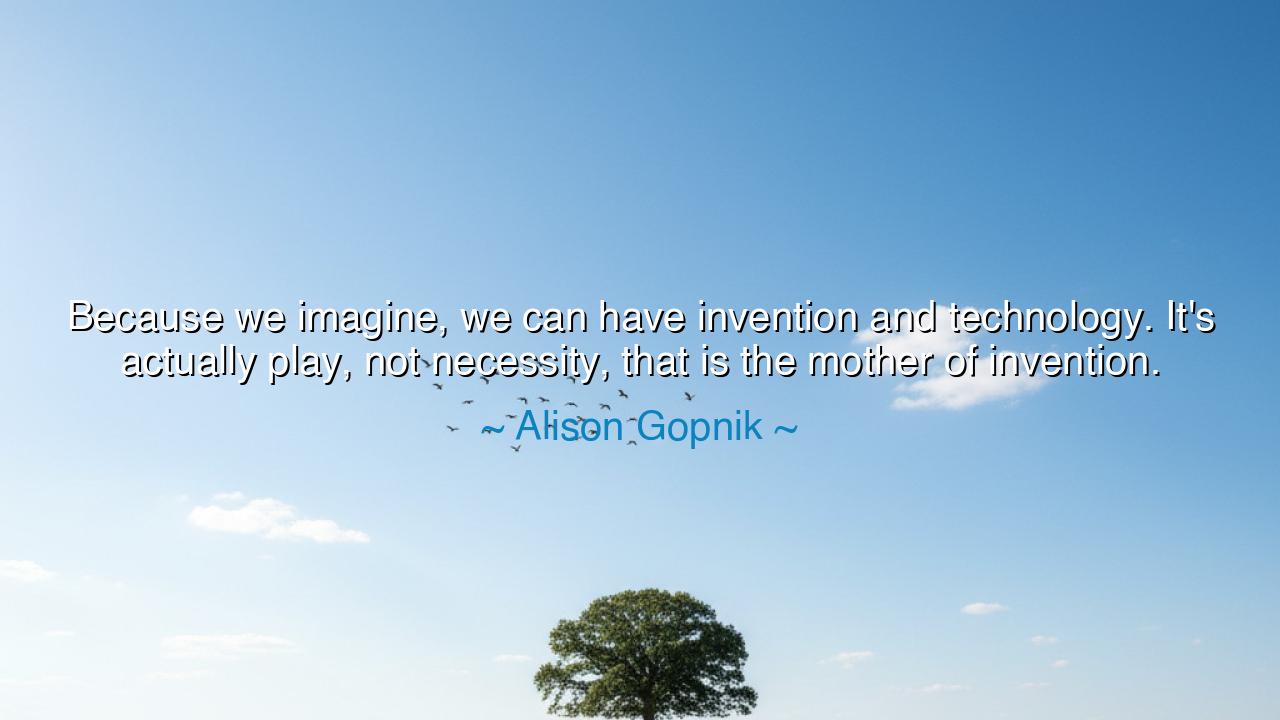
Because we imagine, we can have invention and technology. It's
Because we imagine, we can have invention and technology. It's actually play, not necessity, that is the mother of invention.






Hear the words of Alison Gopnik, who looked into the heart of human creativity and declared: “Because we imagine, we can have invention and technology. It’s actually play, not necessity, that is the mother of invention.” These words rise against the old saying that necessity alone drives innovation. She reminds us that before hunger sharpened tools, before survival demanded fire, there was something older, something deeper—imagination itself. It is this spark, born from wonder and play, that lights the path to creation.
She begins with the gift of imagination. Unlike the beasts of the field, who labor only for survival, man dreams beyond what is needed. He asks, what if? He envisions not only food and shelter, but music, flight, and machines to touch the stars. It is not hunger alone that builds, but the delight of the mind wandering beyond the present. When children play, they invent worlds without rules, devices without blueprints, and futures without boundaries. In their laughter lies the root of every great discovery.
Thus, she overturns the ancient phrase “necessity is the mother of invention.” For necessity may push the hand, but it is play that frees the soul. Necessity gives us the plow; play gives us the rocket. Necessity gives us the hut; play gives us the cathedral. Necessity sustains life; play enlarges it, glorifies it, transforms it. In play, man dares to create not because he must, but because he can. This is the seed of genius.
History offers us countless mirrors of this truth. Consider Leonardo da Vinci. His notebooks were filled not with tools for survival, but with playful imaginings—flying machines, fantastical weapons, sketches of bodies and heavens. Many of his designs had no immediate use, yet centuries later, his visions inspired realities. Da Vinci’s playful imagination became the ancestor of airplanes and helicopters. He was not pressed by necessity to imagine such things—he was compelled by curiosity and delight.
Or think of the Wright brothers, bicycle makers by trade. They did not need to fly to survive. They played with wings and gliders, toyed with models in the wind, dreamed of rising into the air. Their play gave birth to powered flight, a creation that changed the destiny of nations. Here we see Gopnik’s wisdom: invention is not only the child of need, but of joyful experimentation.
This lesson carries into every age. In our time, much of modern technology—from video games to smartphones—was not born out of desperate need, but from play, curiosity, and the desire to push boundaries. The internet itself began as a playful experiment in linking information, which grew into a network that reshaped the earth. What began in curiosity now sustains economies and cultures. The playful spark ignited the torch that necessity later carried.
The teaching is clear: if you would invent, do not wait only for necessity to drive you. Nurture your imagination. Allow yourself to play, to explore, to wander in thought. Do not scorn play as useless, for it is the cradle of genius. Practical actions follow: set aside time for unstructured thought, for tinkering, for dreaming without immediate purpose. Let children play freely, for in their games lies the power to shape the future. And let adults rediscover the spirit of play, so that their labor is not only survival, but creation.
Thus, Alison Gopnik’s words ring with timeless force: play is the true mother of invention. When man imagines, he rises above necessity; when he plays, he creates worlds. This is the gift of imagination—to turn the spark of delight into the fire of progress, and to remind us that the greatest inventions are not only answers to need, but celebrations of possibility.






AAdministratorAdministrator
Welcome, honored guests. Please leave a comment, we will respond soon